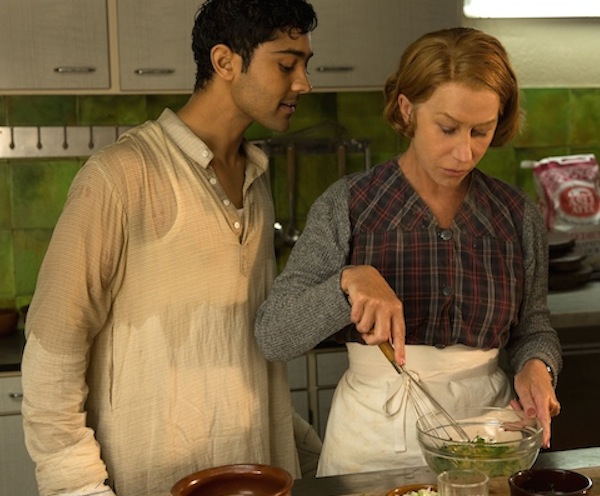Film Review: “The Hundred-Foot Journey” — Foodie Flapdoodle
Given that this film was directed by Lasse Hallström, who gave us the gastronomically wonderful Chocolat, it is hard to understand how things could have gone so wrong.
The Hundred-Foot Journey, directed by Lasse Hallström from a screenplay by Steven Knight. At screens around New England.
Boston Area Film Schedules – What is playing today, Where and When
By Glenn Rifkin
If you love foodie movies, and you saw the months-long barrage of promos for The Hundred-Foot Journey, your mouth had to be watering. Based on the previews, this feel-good concoction had all the ingredients to suggest a sumptuous feast of a film. The dazzling Helen Mirren plays the dour doyenne of a fine traditional restaurant somewhere in the gorgeous French countryside. And who shows up across the lane? A wayward family from India ready to open a garish Indian eatery. She is appalled; the wonderful Om Puri, playing the patriarch of this proud Indian clan, is determined to succeed. Cue hilarious kitchen hijinks.
Unfortunately, as is often the case, the tantalizing previews only heighten the disappointment. The film turns out to be a low calorie affair saddled with a weak script and a ho-hum and meandering storyline. If you are expecting a culinary accomplishment to join the pantheon of illustrious foodie fare like Big Night, Babette’s Feast and Eat, Drink, Man, Woman, you will be seriously let down.
Given that the film was directed by Lasse Hallström, who gave us the gastronomically wonderful Chocolat, it is hard to understand how things could have gone so wrong. But they do, and no amount of curry powder or cardamom would be able to spice up such a bland product.
Based on the novel by Richard C. Morais, Journey is the story of two worlds colliding in an unlikely setting. The Kadam family, driven from their native India by political strife, heads to Europe. Generations of Kadams have owned restaurants. The spirit of the deceased wife of the family’s patriarch Papa (Puri) tells him that disastrous car trouble in a picturesque French village can only mean one thing: here is the place to drop anchor and start again.
Madame Mallory (Mirren) doesn’t bother to disguise her disgust with the garish Indian eatery that the Kadams open across from her opulent, Michelin-starred restaurant. She is not only unwelcoming but downright rude. Disgusted by the sound of Indian music and the smell of curry wafting across the road, she takes her complaints to the mayor of the village.
But Papa is as stubborn as Madame, and he has a secret weapon: son Hassan (Manish Dayal), who learned the fine art of Indian cooking from his late mother. The young man is a budding star chef gifted with a rare but remarkable sensibility regarding all things culinary. Of course, working in Madame’s kitchen is the beautiful and unattached sous chef Marguerite (Charlotte Le Bon), who is intrigued and attracted to the handsome Hassan. Yes, the clichés are everywhere and Hallström is none too subtle when it comes to pushing them into our faces, figuring that a foodie rom-com just can’t miss.
The first third of the movie actually had potential. The witty (and combative) repartee between Madame Mallory and Papa is amusing and the jousting sets the stage for the inevitable golden age romance that follows. The predictable xenophobic response in the village to these foreigners gives the film a bit of much-needed edge, setting up the need for a bridge across the wide divide between cultures and culinary acceptance.
But soon the script meanders in a search for a way forward. Hassan dramatically crosses the road — the hundred foot journey as it were — to take over as chef for Madame Mallory and he quickly becomes a superstar in the klieg-light world of French cuisine. The film inevitably bogs down in dreary montage shots of a lonely and depressed Hassan trying to cope with life in Paris while his heart remains in the village. His romance with Marguerite becomes the nexus of the film and the resulting over dependence on cloying ineptitude evokes the title of another film: Heartburn. Ironically, the care and creation of the gastronomic delights, which is inevitably one of the stars in any great foodie film, is largely absent here.
Given the talent involved, watching The Hundred-Foot Journey is like sitting down at a fancy restaurant only to be served a Big Mac and fries.
Glenn Rifkin is a veteran journalist and author who has covered business for many publications including The New York Times for more than 25 years. Among his books are Radical Marketing and The Ultimate Entrepreneur. His efforts as an arts critic and food writer represent a new and exciting direction.


